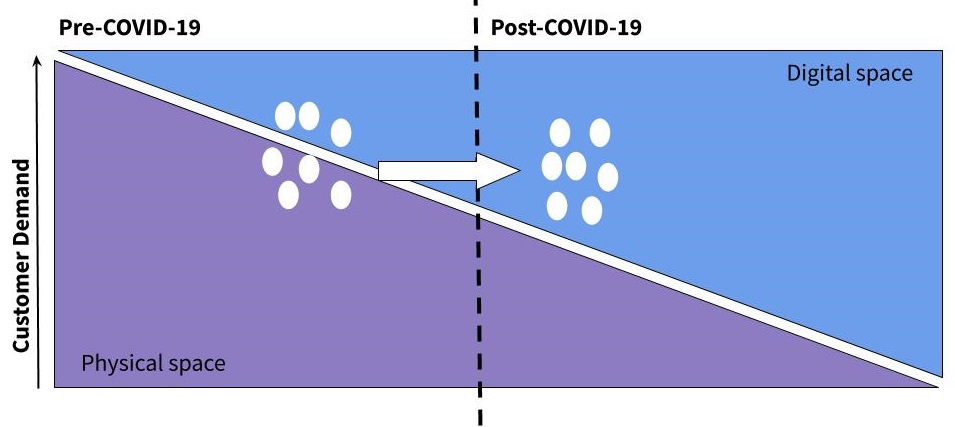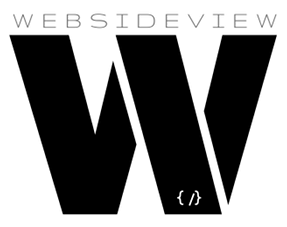The rush to online
It's time to get digital.
Before COVID-19 hit the world, many traditionalist were maintaining the status quo ignoring the fact that vast numbers of consumers had moved their browsing and purchasing activities online.
being in the web rather than on the web.

They are looking for products and services through search engines, social networks, WhatsApp, Alexa, Siri etc via their smartphones, tablets, laptops and smart TVs.
Consuming news, videos and entertainment at home, online rather than venturing out into crowded places where they have to wait around for what they wanted.
Consumers want to:
- consume what they choose
- consume when they choose
- a personalised experience
- discovery new things in a meaningful way.
They leaned towards opting for the “path of least resistance” because its easy and the human condition.
A few examples:
1.) If you have young children when was the last time you used your phone, tablet or YouTube as a pacifier?
2.) If you have teenage children have you seen that they are randomly dancing in front of their phones? Yep TikTok has a lot to answer for ha ha.
3.) When you are hungry and cant be bother to cook its much easier to log on to Hungry House or Just Eat and order in right?
(No need to search around for cash at home, have to pop out to the bank to get cash out so you can pay when it arrives. Just place your order put on Netflix and wait for that knock on the door).
There’s a reason Just Eat have invested heavily in advertising, just look at their video ads that you see on your TV, online on Facebook, on YouTube etc seemingly following you around.
The Netflix effect term has been coined and Blake Morgan puts it well in her 2019 article – “What is the Netflix Effect“
“a move towards more convenient, personalized content. The success of Netflix shows that consumers want products that are easy to use and tailored to match their preferences. Every company, no matter the industry, can learn from Netflix and apply the principles of innovation, disruption and personalization. If they don’t, they run the risk of being disrupted by the growing media giant that is Netflix.“
The deadline for getting online was fast approaching in 2014, you were behind in 2017, late in 2018 and extremely late in 2019.
Then 2020 arrived and COVID-19 started to devastate nations across the globe and sadly continues to today both health-wise and economically.
Everything change overnight, on the 23rd March 2020 for those in the UK.
As I am sat here, at my desk at home, I really feel for so many business owners, self employed and employees that have been taken by surprise and are still trying to make sense of what this new world of digital means for them and their former normal.
I especially feel for the small to medium sized companies that thought that the cost of getting online wasn’t warranted, seeing it as a nice to have rather than a necessity. Ignoring advice from myself and so many other professionals that live and breath digital, looking at many many different data points that include consumer behaviour, psychology, societal factors, economic factors, geo-political factors, supply chains, technology and many others.
The argument can be made that big companies have the resources and influence to include and deploy much more in their digital strategy and I agree with that because they can buy in talent, merge and acquire competitors.
However,
this is no longer the industrial age and although big companies can do these things, self-employed and small to medium sized companies make up a huge part of the economy.
Just take a look at the “UK Small Business Statistics” by the Federation of self-employed and small business (FSB) – https://www.fsb.org.uk/uk-small-business-statistics.html
SMEs and the Economy:
- At the start of 2019 there were 5.82 million small businesses (with 0 to 49 employees), 99.3% of the total business.
- SMEs account for 99.9% of the business population (5.9 million businesses).
- SMEs account for three fifths of the employment and around half of turnover in the UK private sector.
- Total employment in SMEs was 16.6 million (60% of the total), whilst turnover was estimated at £2.2 trillion (52%).
The digital/information age affords so many opportunities for businesses and not every company has to be a Facebook, Twitter, TikTok, Netflix, Asda, Tesco, Morrisons, Boots Wallgreens etc. Every private or public business, social enterprise and not for profit has a part to play in the economic and societal ecosystem.
Companies that already had a digital strategy they were deploying are faring much better than their counter parts in their particular sectors.
Greengrocers with an online presence and were already doing home deliveries became beneficiaries and unsung heroes as they continued and increased activities to feed the nation.
Innovative bar owners realised the power of online and started providing home delivery cocktails, leveraging the power of their website, Facebook, online payments and other digital technologies.
Others have had to “copycat” as best they can but are quickly realising it is a minefield if you do not know what you are doing.
Having to learn through trial and error, making some catastrophic mistakes. Not getting the ROI as quickly as they would expect for the simple reason being that people don’t just come to you because you are now online, the rules of business still apply online.
Public sector organisations, councils and charities are no exception to this.
Some have realised the need to “go digital”, going on a hiring frenzy to try and find the right people for the job but hiring managers struggle to put a price on the value an individual expert/professional will bring to the organisation as they often do not understand digital only that they need someone to help.
It is our job as professionals to flip the script, listen to understand the other perspectives, then educate (something we have been actively doing) before deploying any solutions.
Yes there has been a rush to get online and digital for organisations but we as professionals know that the people within the organisations still do not truly understand what this means for them and their former processes.
There is an assumption and expectation for us to have all the answers to their digital needs however the answers can only come to light when we can speak freely and for people within organisations to understand their limitations, be pragmatic, proactive and open to new ways of doing things.
Without that all we will be doing is putting stick plasters over a much bigger issue which benefits nobody in the long run.
It’s time to forget the status quo as this leaves you vulnerable and could lead to irreparable damage.
We can help you navigate this uncertain time and put in place digital strategies that will help you continue to do business and be successful.
We are here to help so please feel free to get in touch.

